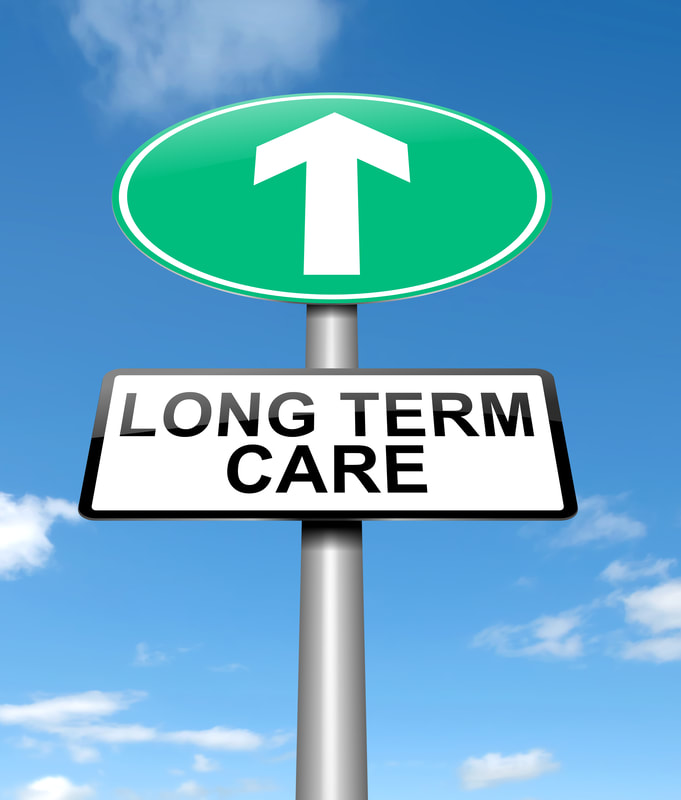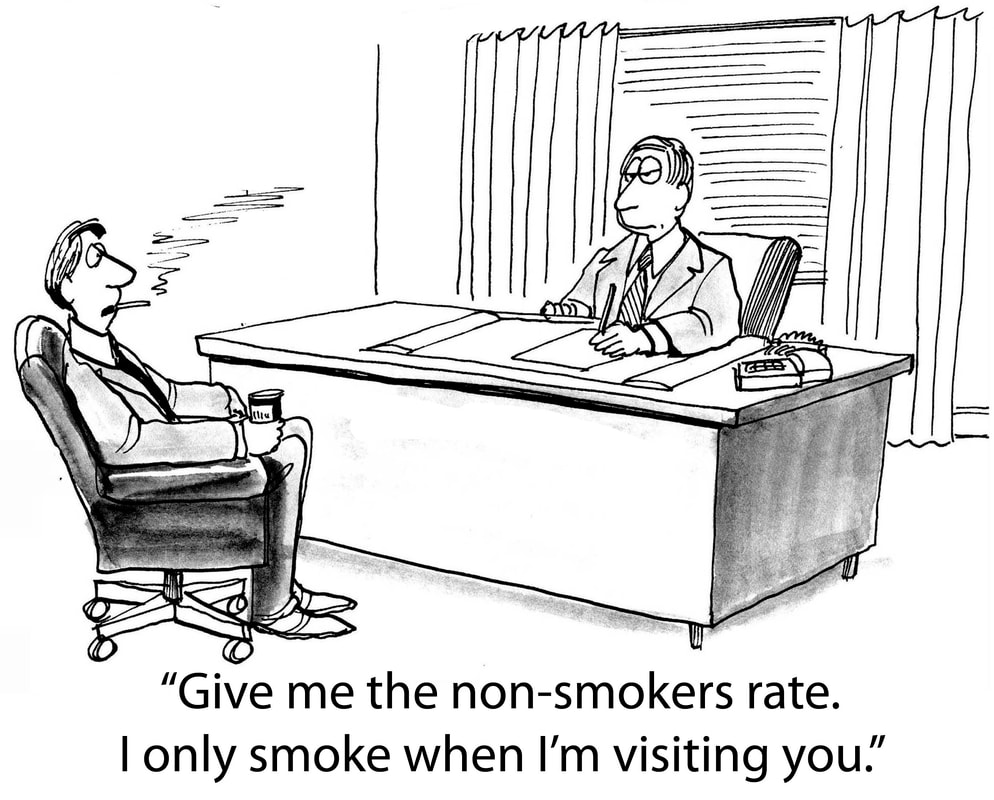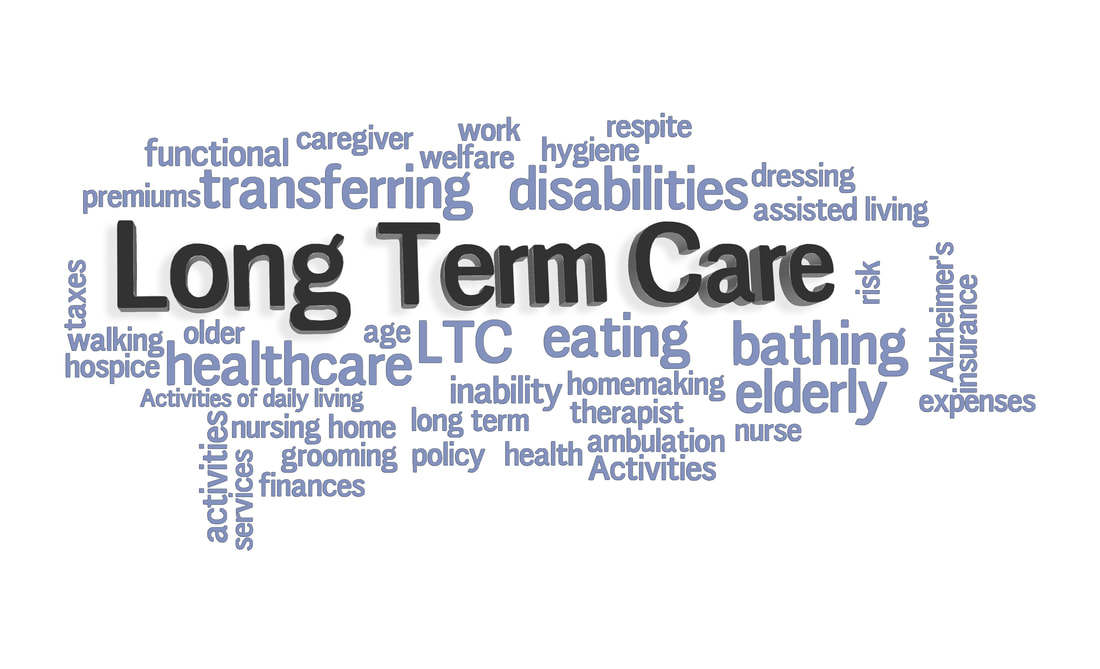Hecht Insurance Advisors, LLC Blog |
Why LTC Planning Is Essential for Boomers
The hefty price tag
If you or a loved one suffers from an illness that requires long-term care, get ready for some sticker shock. A year-long stay in a nursing home typically can cost between $40,000 and $80,000, often more. While prices vary by state and the type of care required, one thing is consistent across the board when it comes to long-term care: it's phenomenally expensive. Just take a look at the average costs of various types of long-term care in the U.S.:
As you can see, these costs can quickly add up and eat away at your nest egg. For example, let's say you hire a home aide to assist your husband just three times a week for four hours. At $19 an hour on average, that would come out at $228 a week. That adds up to nearly $12,000 a year. Unfortunately, Medicare does not cover these exorbitant long-term care expenses. To top it off, informal home care is simply not a realistic option for most families these days. After all, most children of baby boomers are struggling to balance their own work and family life. They simply don't have the time or resources to care for sick parents. This is why it's critical for each and every family to plan ahead for a potentially expensive long-term care event. Without the proper protection, such an event could devastate a family's finances. The simple solution: LTC insurance How can boomers handle the skyrocketing costs of a potential long-term care event? The answer is simple: long-term care insurance. Without LTC coverage, a nursing home stay or another long-term care event could destroy your family's finances. Because LTC insurance covers many of these expenses, this valuable coverage will not only protect your finances it will also help you to maintain your current standard of living if you or your spouse requires long-term care. The takeaway Without LTC insurance, the cost of a nursing home stay or a home health care aide could wreak havoc on your finances and whittle away at that nest egg you've worked so hard to build. Don't burden your loved ones with this kind of emotional and financial strain. Create a long-term care plan today to save your family a lot of heartache and stress tomorrow. If you want to discuss your long-term care insurance options, call us. A professional can evaluate your unique situation and help you customize an effective plan.
0 Comments
How Having a Dog Can Benefit Your Health
More exercise - When you own a dog, you should be taking it out for walks every day. And the benefit is that when you're exercising your pooch, you too are exercising. Walking 30 minutes a day can do wonders for your health.
Less stress - Numerous studies have shown that people with dogs have lower stress levels. Engaging with your dog in whatever form can reduce your stress. Illness detection - Dogs really see the world through their noses thanks to their keen sense of smell. Some dogs are sensitive enough to detect the onset of epileptic seizures, or the presence of some cancers. Many dog owners have reported their dog sniffing, licking or nudging areas of the body that later turned out to be cancerous. More allergy tolerance - Children who are raised around pets have a reduced chance of having allergies. And growing up with a dog can boost immunity to pet allergies later in life. Boosting brain development - Dogs boost brain development in children, along with emotional growth and connection to others. Stronger heart - Studies have shown that petting a dog can lower your heart rate, and male pet owners tend to have reduced rates of heart disease. Less chance of depression - Dog owners are less likely to be depressed. The companionship they offer has been shown to help people who have been diagnosed with clinical depression, largely because caring for another living thing can help relieve symptoms of depression and make people feel more positive. Safety - Dogs are like a living alarm system. Barking dogs can keep burglars at bay and they can alert you if someone is snooping around the outside of your house, giving you a greater sense of security. Homeowner's Insurance Issues during Coronavirus Outbreak
Here's what you should know about your homeowner's insurance at this time. Business at home If you have had to move your business to your home, you may want to review your homeowner's coverage. The typical homeowner's police have very low limits on business property (usually up to about $2,000), which would likely not be enough if your equipment is damaged or stolen. If you are suddenly running your business from home, please call us and we can go through your policy and, if needed, we can work with your insurer to see if they offer a home business endorsement or higher coverage limits for business property. Also, if you are running an Airbnb out of your home for a room or another property, you should have purchased landlord coverage or home-sharing coverage as a typical homeowner's policy may not cover damage incurred by paying guests. At this time, you are likely not getting anybody staying at your place, so you should contact your insurance company about pausing or canceling coverage since you will have no need for it for a while. Filing a claim If you have an incident in your home and need to file a claim, there's a good chance that your insurer will be unable to send an adjuster for an inspection. Most homeowner's insurers now have apps or offer you the ability to file your claim online on their website. The procedures for filing a claim using an app or doing it on your insurer's website is pretty straightforward. You can start by taking pictures of the damage and providing receipts or a list of the property that may have been damaged or stolen. If it was stolen, make sure you file a police report and submit that with the claim as well. However, if you have a high-dollar claim, the insurer may send an adjuster to inspect the damage before they pay the claim. For smaller claims, it's likely they will pay them out. What insurers are doing Insurers are making adjustments to their operations and policies during this time as well. Their actions will vary from company to company, but there are similarities in some of their responses:
How to Stay Sane if You Are Isolating
Virtual coffee chats and dinners
Get together with friends you may have planned to meet for coffee, lunch or dinner but via video chat. You have plenty of options in tech that can be used on your computer and/or smartphone and tablet. Brew yourself some coffee or your favorite tea and start up your Facetime, WhatsApp, Google Hangouts, Skype or any other app that has a video call feature. If you want some human contact, you could even arrange to open one of the apps as you and a friend sit down for dinner in your respective abodes and have some nice conversation over a meal. Virtual gyms If you have a regular class with a yoga instructor, see if they want to start conducting their classes by video. There are a few teleconferencing applications that allow for a conference call-type format where participants are given a password to join the meeting. The instructor can then teach the class to anyone of their current customers that wants to join. This is already happening in Spain and Italy. Also, if you already have a gym membership, many gyms are starting to offer virtual classes as well. And many are also offering free classes online. Classes that are geared for groups are the most conducive to online training, such as Zumba, Pilates, yoga and aerobics-type sessions. If you are feeling overwhelmed by the coronavirus outbreak, you can use exercise to reduce your anxiety and clear your mind. One of the best ways to fight the stagnation of home quarantine is to continue to breathe properly and keep moving. Movement has an amazing effect on your mood and outlook. Meet for a walk You can go on a walk with a friend and keep your social distancing of 6 feet apart to catch up, and also to get the blood pumping. During this time of self-isolation, it's important that you get some form of exercise and long brisk walks are not only good for you, but they also tend to cheer you up. If you have a dog, you can use this time to give your pet extra walks. Your pooch will never decline an invitation for a walk, and a pup can keep you company. Also, if the grocery store is a short distance and you need to pick up a few supplies, consider walking or riding your bike. Reach out to your parents, grandparents Too many old people are lonely and, because of the self-isolation that the elderly are doing now, that can be compounded. Use your newfound free time to keep in touch with your parents, grandparents and other seniors. Use an app with video features. They will appreciate that you are checking on them and they will be happy to see your face. You can even organize one of those coffees or dinners with them, as well. Establish a routine Don't just veg out on the couch and binge-watch TV shows all day. It's best if you can establish a routine. If you are telecommuting, this shouldn't be a problem as you will have to be working during a good portion of your day Monday to Friday. But if you are not working, resist the urge to stay up late watching movies or TV. Try to keep the same routine you had before the outbreak. Virtual book groups You may also be taking the time to catch up on your reading. Perhaps you could organize a book group with friends and family. Pick a book that everyone will read for a week or two, and then have regular video chat meetings to discuss the book, your opinions and thoughts. The takeaway It's hard to fight boredom and taking the path of least resistance if you are self-isolating, but you should try to focus on taking care of your body, mind and emotional well-being during this time. Besides the above suggestions, you can try to learn something new, like playing keyboard or learning to make bread or yogurt or homebrewing. And taking time to be in touch with others can stave off your loneliness and help you keep connected with the people you care about. New Law Requires COVID-19 Paid Sick Leave, FMLA Benefits
Paid sick leave
Employees are entitled to two weeks (80 hours) of paid sick time for coronavirus-related issues. Eligible workers will receive their regular pay, up to $511 per day and $5,110 total. Those caring for someone subject to quarantine due to COVID-19, and parents of kids who can't go to school or daycare, will receive two-thirds of their regular pay, up to $200 daily with a $2,000 cap. The emergency sick leave benefit can be used immediately, regardless of how long the worker has been employed with you. It can be used when they cannot work or telecommute for any one of the following reasons:
The law does not require certification of an order by the government or a health care provider. But employers can require reasonable notice procedures, such as not announcing in the middle of a shift that they take COVID-19 sick leave. But they cannot require the employee to find a replacement worker to cover the shifts they will miss. Employers must post the law's requirements "in conspicuous places." Employers are not allowed to discipline a worker who takes this sick or FMLA leave for coronavirus purposes and, if an employer refuses to provide the leave, they can be ordered to pay both back pay and statutory damages that are equal to the back pay the employee is owed. This law provides payroll tax credits to offset all costs of providing these paid leaves. FMLA The FMLA portion of the law provides for 10 additional weeks of FMLA leave, but only for those who must stay at home to care for a child whose school is closed or their childcare provider is unavailable due to COVID-19-related issues. These 10 weeks will be paid at two-thirds the employee's regular rate of pay, up to $200 per day with a cap of $10,000. They will also receive 12 weeks of leave with job protection, though employers of health care or emergency care providers can exclude such employees. The employee would likely use up their two weeks of paid sick leave before applying for FMLA benefits, which unlike traditional FMLA (which is unpaid), are paid leaves after the first 10 days under the new law. Employees who have been working for more than 30 days are eligible, and the employer can require them to provide reasonable notice that they are taking leave. A final word This law only applies to employers with fewer than 500 workers, so it leaves uncovered those people who work for larger companies. Also, employers need to make financial plans, as the credit cannot be claimed until after the employer pays their payroll taxes. A bigger issue is that the law requires that workers be paid the sick leave even if they are not sick, but have been ordered to self-isolate. In states that have ordered workers to self-isolate, such as California, employers could be faced with an avalanche of paid sick leave claims all at once. This law sunsets on Dec. 31, 2020. IRS Allows HDHPs to Pay for COVID-19 Testing, Treatment Pre-Deductible
Specifically, the new guidance states that HDHPs with attached HSAs will not lose their plan status if they provide medical care services and items related to coronavirus testing or treatment even before an enrollee has met their deductible.
While the regulation does not require HDHPs to cover the testing and treatment without any out-of-pocket expenses by the enrollee, the plans can do so ― and without breaching the rules regarding these plans. The new rule could also pave the way for non-HDHPs like PPOs and HMOs to also provide coronavirus testing without out-of-pocket costs for their participants. While there is no rule preventing them from doing so now, many of the country's large PPOs and HMOs have been reluctant to start offering free testing until they know how HSA plans would be affected. Typically, enrollees in HDHPs with an attached HSA are required to pay all of their medicinal costs up to their deductible before the insurer will pay. The Trump administration earlier issued another rule that allows HDHPs to foot the bill for certain preventative health services, such as vaccines and screenings for specific conditions like diabetes and high blood pressure, before the deductible is met. In 2018, 23% of employees enrolled in employer-sponsored health insurance plans were enrolled in an HDHP with an HSA. The 2020 minimum annual deductible is $1,400 for self-only HDHP coverage, and $2,800 for family HDHP coverage. In notice 2020-15, the IRS says that "Due to the unprecedented public health emergency posed by COVID-19, and the need to eliminate potential administrative and financial barriers to testing for and treatment of COVID-19, a health plan that otherwise satisfies the requirements to be an HDHP under section 223(c)(2)(A) will not fail to be an HDHP merely because the health plan provides medical care services and items purchased related to testing for and treatment of COVID-19 prior to the satisfaction of the applicable minimum deductible." The notice only applies to coronavirus and does not void any other requirements governing HDHPs and HSAs. It states that "Individuals participating in HDHPs or any other type of health plan should consult their particular health plan regarding the health benefits for testing and treatment of COVID-19 provided by the plan, including the potential application of any deductible or cost sharing." The decision came after the American Benefits Council, which includes many of the largest corporations in the country, sent a letter to the Treasury Department asking it to confirm that HDHPs could cover COVID-19 testing and treatment without enrollees first having to meet their deductibles. Can You Legally Refuse to Hire Nicotine Users?
Already, some hospitals have instituted similar policies, and Alaska Airlines has had a policy of not hiring smokers since 1985. But with U-Haul making the move, other companies, both large and small, are weighing the choice of whether they should implement a similar policy.
Although U-Haul subsidiaries operate in all 50 US states, the policy will be implemented in the 21 states that do not have discrimination protections for smokers on their books. Those states are: Alabama, Alaska, Arizona, Arkansas, Delaware, Florida, Georgia, Hawaii, Idaho, Iowa, Kansas, Maryland, Massachusetts, Michigan, Nebraska, Pennsylvania, Texas, Utah, Vermont, Virginia and Washington. Benefits of a no-nicotine policyA 2013 Ohio State University study that reviewed smoker absenteeism, productivity and health insurance, found that they cost their employers an average of $6,000 more per year than those who have never smoked. Smokers overall are less productive. A 2007 Tobacco Journal study by Petter Lundborg of University of Amsterdam found that smokers took 11 more sick days per year than nonsmokers did - eight days when you factor in variables like a smoker's tendency to take more risks and have poorer health. There also are other indirect effects on productivity, such as an increased rate of early retirement in smokers, the study found. Other studies have found that tobacco users have an increased risk of short-term illness, and a higher risk of developing chronic illness, resulting in even more missed days and significantly higher health care costs. Smokers can also have a negative impact on employee morale, as non-smoking colleagues may perceive that they abuse their breaks and do less work as a result. Tough choice for employers Employers who are considering similar policies need to tread carefully. Twenty-nine states and Washington, D.C. have laws on the books that bar employers from discriminating against an employee's lawful off-duty activities (such as nicotine usage) or prohibit discrimination based on tobacco use. Also, if you have operations in multiple states you would have to roll out different policies in different jurisdictions, which ends up costing your organization more money. On the other hand, there are no federal laws barring action against nicotine users. For example, nicotine addiction is not a disability under the Americans with Disabilities Act. Attempts by government employees to gain protection for their right to use nicotine products have routinely been shot down by courts. Given the state-specific nuances associated with this issue, you should consult an attorney if you are thinking about implementing a nicotine-free hiring policy, to make sure you can do so under the law. Additionally, employers who have tough rules on nicotine use may have a harder time attracting talent, potentially causing them to miss out on strong candidates who use nicotine products. All this said, employers can still regulate and limit an employee's on-site nicotine use in the workplace. It's wise to have policies in place that bar smoking and vaping on the premises to protect customers, the general public and your non-smoking employees from second-hand smoke and vape. Studies have shown that the best way to get someone to quit smoking is not through punitive measures, but through incentives. Many wellness plans include smoker cessation programs that provide incentives to employees who quit smoking. Some of these programs impose surcharges on nicotine users that are then used to cover claims and pay for administrative expenses under the employer's group health plan. The specter of having a severe illness or injury that requires long-term care is a scary proposition for most anybody, not to mention the financial obligations you would face. But trying to time when is the best age to purchase a policy is not an easy decision. Obviously, you don't want to buy the policy too early and unnecessarily spend thousands of dollars on premium over your life for coverage you may not need until you are much older. The younger you are when you buy a policy, the lower your premiums. That said, people typically do not purchase long-term care policies in their 30s or 40s since they are looking at a long time-horizon for when they would need to file a claim. After all, the policy may not be needed for 30 years or more. At the same time, if you wait until you are in your late 60s or early 70s, the premiums may be cost-prohibitive for you - not to mention you may have trouble finding an insurer willing to write your policy. For example, based on the "Genworth 2019 Cost of Care Survey," if purchased today, a long-term care policy with a maximum daily benefit of $150 a day for three years would cost an estimated:
As you can see, the ideal time cost-wise is probably in your 50s and 60s. But before pulling the trigger, you should think about how the premiums fit into your life and other obligations. If you have children who have not yet graduated from college, they will be your major concern. You should carry enough life insurance to see them through. But after your children, if any, are on their own, you might take the funds you were using to pay for life insurance premiums and use them to finance long-term care insurance premiums instead. What policies cover Long-term care insurance covers:
When shopping for a policy, you will have many choices to make: The trigger - Policies will have a trigger for when payments can commence. Often, policies base qualification on cognitive impairment or the need for assistance in at least two activities of daily living (dressing, toileting, eating, transferring, bathing and continence). Inflation riders - As you know, health care inflation is never-ending. While $150 may be sufficient to cover your cost of care today, that may not be the case in a decade or 20 years from now. With long-term care insurance, you often have the option to buy an inflation rider with the policy, which will increase the allowance for daily benefits by a certain percentage a year, like 5% on a flat or compound basis. But, you need to know that this type of rider comes with a price in increasing premiums. Some experts recommend that buyers aged under 70 purchase an inflation rider, while anybody older than 70 does not need to do so. Elimination period - The elimination period is the time the insured must wait before the policy starts paying out. During that period of waiting, you will be on the hook for long-term care expenses. Typically, the waiting period is anywhere from one to 90 days, but it could be even longer. The longer the elimination period, the lower the premium. That said, the premium savings you achieve by choosing a longer elimination period may not be worth it for you. Don't fall into the disclosure trap One thing you have to be very careful about when applying for long-term care insurance is full disclosure about your pre-existing conditions or prior illnesses. If you fail to tell the insurer about an illness, the company may refuse you coverage at the time you file for benefits. It's in your best interest to be upfront about your health, as you would rather be denied during the application process than have your claim denied after paying your premiums for years. There are other options available: There are life and annuity products with long-term care options available depending on your health, age, and resources that can work well too. Ready find solutions to your long-term care needs?
Employers Guide for Dealing with the Coronavirus
On top of that, if you have workers who come down with the virus, you will need to consider how you're going to deal with sick leave issues. Additionally, workers who are sick or have family members who have stricken, may ask to take time off under the Family Medical Leave Act.
Coronavirus explained According to the Centers for Disease Control, the virus is transmitted between humans from coughing, sneezing and touching, and it enters through the eyes, nose and mouth. Symptoms include a runny nose, a cough, a sore throat, and high temperature. After two to 14 days, patients will develop a dry cough and mild breathing difficulty. Victims also can experience body aching, gastrointestinal distress and diarrhea. Severe symptoms include a temperature of at least 100.4ºF, pneumonia, and kidney failure. Employer concerns OSHA - OSHA's General Duty Clause requires an employer to protect its employees against "recognized hazards" to safety or health which may cause serious injury or death. According to an analysis by the law firm Seyfarth Shaw: If OSHA can establish that employees at a worksite are reasonably likely to be "exposed" to the virus (likely workers such as health care providers, emergency responders, transportation workers), OSHA could require the employer to develop a plan with procedures to protects its employees. Protected activity - If you have an employee who refuses to work if they believe they are at risk of contracting the coronavirus in the workplace due to the actual presence or probability that it is present there, what do you do? Under OSHA's whistleblower statutes, the employee's refusal to work could be construed as "protected activity," which prohibits employers from taking adverse action against them for their refusal to work. Family and Medical Leave Act - Under the FMLA, an employee working for an employer with 50 or more workers is eligible for up to 12 weeks of unpaid leave if they have a serious health condition. The same applies if an employee has a family member who has been stricken by coronavirus and they need to care for them. The virus would likely qualify as a serious health condition under the FMLA, which would warrant unpaid leave. What to do Here's what health and safety experts are recommending you do now:
If you have an employee you suspect has caught the virus, experts recommend that you:
If there is a massive outbreak in society, consider whether or not to continue operating. If you plan to continue, put a plan in place. You may want to:
|
Contact Us(540) 712-2199 Archives
May 2023
Categories
All
|










 RSS Feed
RSS Feed